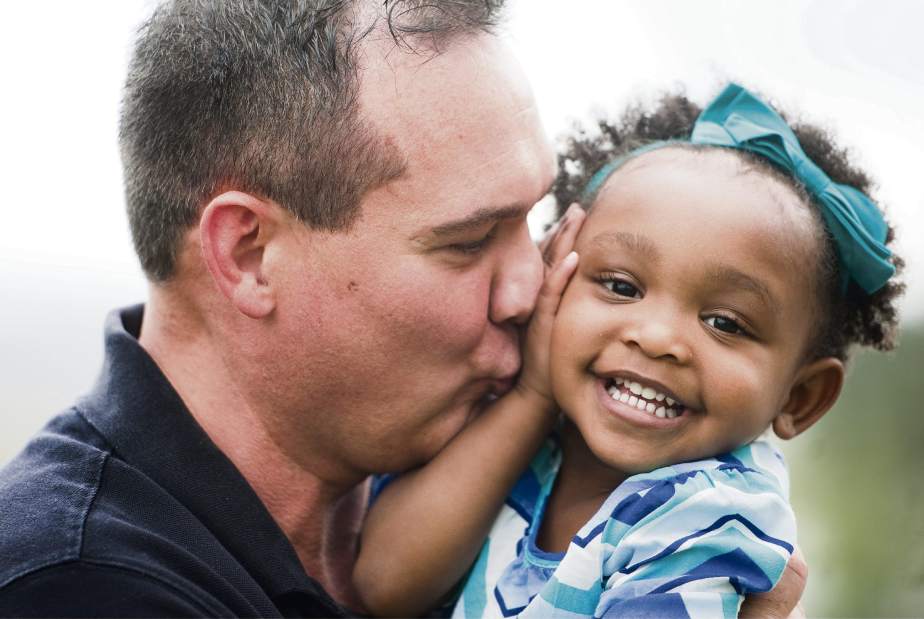https://archive.triblive.com/local/westmoreland/latrobe-couple-pushes-for-legislation-to-strengthen-adoption-tax-credit/
Latrobe couple pushes for legislation to strengthen adoption tax credit

Steph Chambers | Tribune-Review
Eric Brinker kisses his daughter Eternity, 2, at their Unity home on Friday, April 22, 2016. Christine and Eric Brinker, who have adopted eight children, briefed members of Congress this week in Washington on the merits of a bill providing an adoption tax credit.
When an orphanage or family calls, from Guatemala to Latrobe, Christine Brinker can't say no.
The evidence lies in the string of red frames full of baby pictures stretching across a family room shelf, the photo collages propped against the fireplace mantel and the sound of little feet clad in shoes that squeak with each toddler step.
Brinker, 46, said a love of children has led her and husband, Eric, 49, to adopt eight children in addition to their two biological children, who are now adults.
Christine Brinker jokes she has two “homegrown” and eight — soon to be 9 — “imports.”
Some of the children have spina bifida. One has the neurological disease Rett syndrome. But the Brinkers don't bat an eye.
“We didn't set out to rescue anyone. ... We just really loved children,” Christine Brinker said, sitting in her spacious Unity home. “I always wanted to adopt since I was little.”
Last week, the Brinkers, who own a natural health medicine practice, became the face of a national push to strengthen a federal tax credit for adoptive families, a move advocates say would help thousands of families afford adoption. While adoptions from foster care are relatively inexpensive, international adoptions — and some domestic adoptions — can range from $25,000 to $45,000 per child.
Christine Brinker and her daughter, Grace, 15, spoke before a congressional panel last week to brief members and their staffs on a pair of bills sponsored by Sen. Bob Casey, D-Pa., and Rep. Diane Black, R-Tenn.
The legislation would change the adoption tax credit so all families could claim the maximum — which was $13,400 for 2015 — for expenses incurred during the adoption process, even if they didn't owe $13,400 in taxes that year.
“You're doing everything you can to put that (money) together,” Christine Brinker said of the legal fees, court costs and other expenses a family incurs. “Most people (will) put that right back into those kids.”
Currently, a family can receive credit for adoption expenses up to the amount of their tax liability, or the amount they owe the federal government. This means low- and middle-income families, who owe a smaller amount in taxes — but whom advocates say would benefit most from the credit — get to claim only a portion of it, if any.
The credit can be redeemed piecemeal over six years to allow more of it to be claimed, but the new legislation would enable a family to claim the full amount the year they adopt.
Not everything at last week's briefing was about numbers. Grace Brinker offered lawmakers and staffers a personal, more emotional testimony.
“I told them what adoption means to me,” said Grace as she rattled off statistics about her home country of Guatemala, where many children don't live past the age of 5 and about 80 percent are malnourished.
“I have a roof over my head, food to eat and two parents who show me unconditional love,” Grace said. “It's not just a bill. It's helping a child have a home.”
There were more than 70,000 adoptions in the United States in 2015, with about 50,000 of them coming from foster care, said Joe Kroll, executive director of Voice for Adoption, a Washington-based advocacy group. International adoptions accounted for 5,400, and private, domestic adoptions were estimated to be 15,000 to 18,000, he said.
Kroll said he's been pushing for the adoption tax credit to be refundable — advocacy parlance for the proposed changes — for more than a decade. He estimates as many as 40 percent of adoptive parents don't have any tax liability after other deductions, so they get no help from the existing adoption tax credit.
Christine Brinker said that most adoptive families would immediately plow the refunded money from the tax credit into items and services their newly adopted child needs, which can include medical care or therapies not covered by insurance.
She's trying to raise awareness so the legislation can garner more co-sponsors, making it more likely to get a congressional hearing and, eventually, a vote.
“It's such a quick, easy phone call for families (to make to lawmakers) to say, ‘I support this,' ” Christine Brinker said. “Everybody knows somebody who's adopted or wants to.”
Brinker has a personal stake in the fight: She and Eric are in the early stages of adopting their ninth child, a 22-month old boy from China.
For Eric Brinker, who admits he figured the couple would adopt once again, it's still awe-inspiring to bring a new child home.
Once you have that child who is legally yours, he said, it doesn't matter if he is from “the heart or the womb.”
Kari Andren is a Tribune-Review staff writer. Reach her at 724-850-2856 or kandren@tribweb.com.
Copyright ©2025— Trib Total Media, LLC (TribLIVE.com)
